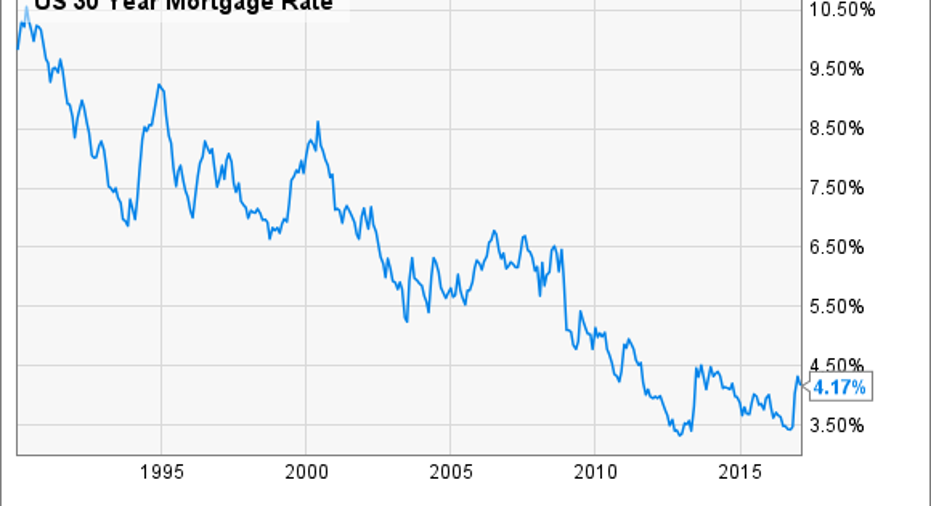This Is the Average American Homebuyer In 2017

It's one thing to hear the minimum requirements to get approved for a mortgage, but it's quite another to look at the characteristics of buyers who actually got approved and bought homes. For example, the minimum required FICO credit score for a conventional mortgage is 620, but very few buyers get approved with such low scores. In fact, 96% of approved buyers have a score of 650 or above. With that in mind, here's some information about mortgages and homebuyers who were approved in January 2017, according to the Ellie Mae Origination Insight report.
Conventional loan or FHA
In January 2017, nearly two-thirds (66%) of originated mortgages were conventional loans -- that is, mortgages not insured by the FHA, originated by the Department of Veterans Affairs (VA loans), or another organization.
Data source: Ellie Mae Origination Insight Report, January 2017.
It's also worth mentioning that just over half (53%) of all originated mortgages were for home purchases, with the rest refinancing loans.
Image source: Getty Images.
Nearly all American homebuyers use fixed-rate mortgages
Before the financial crisis, and during historical time periods where interest rates have been higher, adjustable-rate mortgages were more common. These days, however, mortgage rates are close to record lows, so the benefits of adjustable-rate mortgages are simply not valuable enough to justify getting one for most homebuyers.
US 30 Year Mortgage Rate data by YCharts.
In January 2017, just 5.4% of all originated mortgages were adjustable-rate mortgages, or ARMs. Almost all originated ARMs were conventional loans -- just 0.3% of FHA mortgages and 0.1% of VA loans were ARMs.
The average interest rate is 4.31%, but it can vary significantly
The overall average interest rate for 30-year mortgages closed in January 2017 was 4.31%. At 4.01% on average, VA loans had the lowest interest rates, followed by FHA loans at 4.23%. Conventional loans had a higher average interest rate of 4.42%, which makes sense because interest rates of conventional mortgages vary more with credit scores than the other loan types.
Data source: myFICO.com. Data as of 2/21/2017.
The average buyer's credit score is higher than you may think
I already mentioned this briefly in the introduction. While it's possible to obtain a conventional mortgage with a FICO credit score as low as 620, and an FHA loan can be approved with a credit score in the 500s, the average buyer who actually gets approved has significantly better credit than the minimum.
In fact, the average conventional mortgage borrower has a FICO score of 752, while the average FHA buyer has a 686. The overall average for all mortgages closed in January 2017 was a FICO score of 722.
Data source: Ellie Mae Origination Insight Report.
Keep in mind that credit is only one piece of the puzzle when applying for a mortgage. Your credit score will be considered, but a lender also expects to see a solid employment history, enough assets and income to justify the loan, and an acceptable debt-to-income (DTI) ratio. If you have an extremely high FICO score but are borderline in some of the other categories, your strong credit can get you approved. Conversely, if you have a credit score that barely meets the minimum requirements, you'll probably need a stellar employment history and income in order to offset it.
The average buyer's debt-to-income ratio
Lenders generally use two different debt-to-income calculations to qualify borrowers for mortgages. The front-end ratio refers to the buyer's new mortgage payment as a percentage of their pre-tax income, while the back-end ratio refers to the borrower's total monthly debt obligations, including the new mortgage, as a percentage of income. Many lenders have traditionally used ratios of 28% and 36%, respectively, but maximum debt-to-income ratios of up to 45% have become rather common, especially if buyers have significant cash in reserves.
However, as we've been discussing this whole time, lender maximums and guidelines are one thing. Characteristics of actual borrowers who get approved can be much more useful.
For January, the average conventional purchase mortgage resulted in DTI ratios of 23% and 35% for the average borrower, while the average FHA borrower had slightly more debt -- 28% and 43% for the front- and back-end ratios. This makes sense, as the average FHA mortgage is for a greater percentage of the home's price, and all FHA loans include mortgage insurance, further increasing the borrower's monthly obligation.
How to use this information
The takeaway is that by knowing what kind of homebuyer is getting approved for a mortgage, you can be better prepared to go through the process. For example, if your credit score is above the minimum requirements, but is a bit on the low end, it may be a good idea to focus your efforts on increasing your score before applying.
5 Simple Tips to Skyrocket Your Credit Score Over 800!Increasing your credit score above 800 will put you in rare company. So rare that only 1 in 9 Americans can claim they're members of this elite club. But contrary to popular belief, racking up a high credit score is a lot easier than you may have imagined following 5 simple, disciplined strategies. You'll find a full rundown of each inside our FREE credit score guide. It's time to put your financial future first and secure a lifetime of savings by increasing your credit score. Simply click hereto claim a copy 5 Simple Tips to Skyrocket Your Credit Score over 800.
Matthew Frankel has no position in any stocks mentioned. The Motley Fool owns shares of and recommends Ellie Mae. The Motley Fool has a disclosure policy.



















